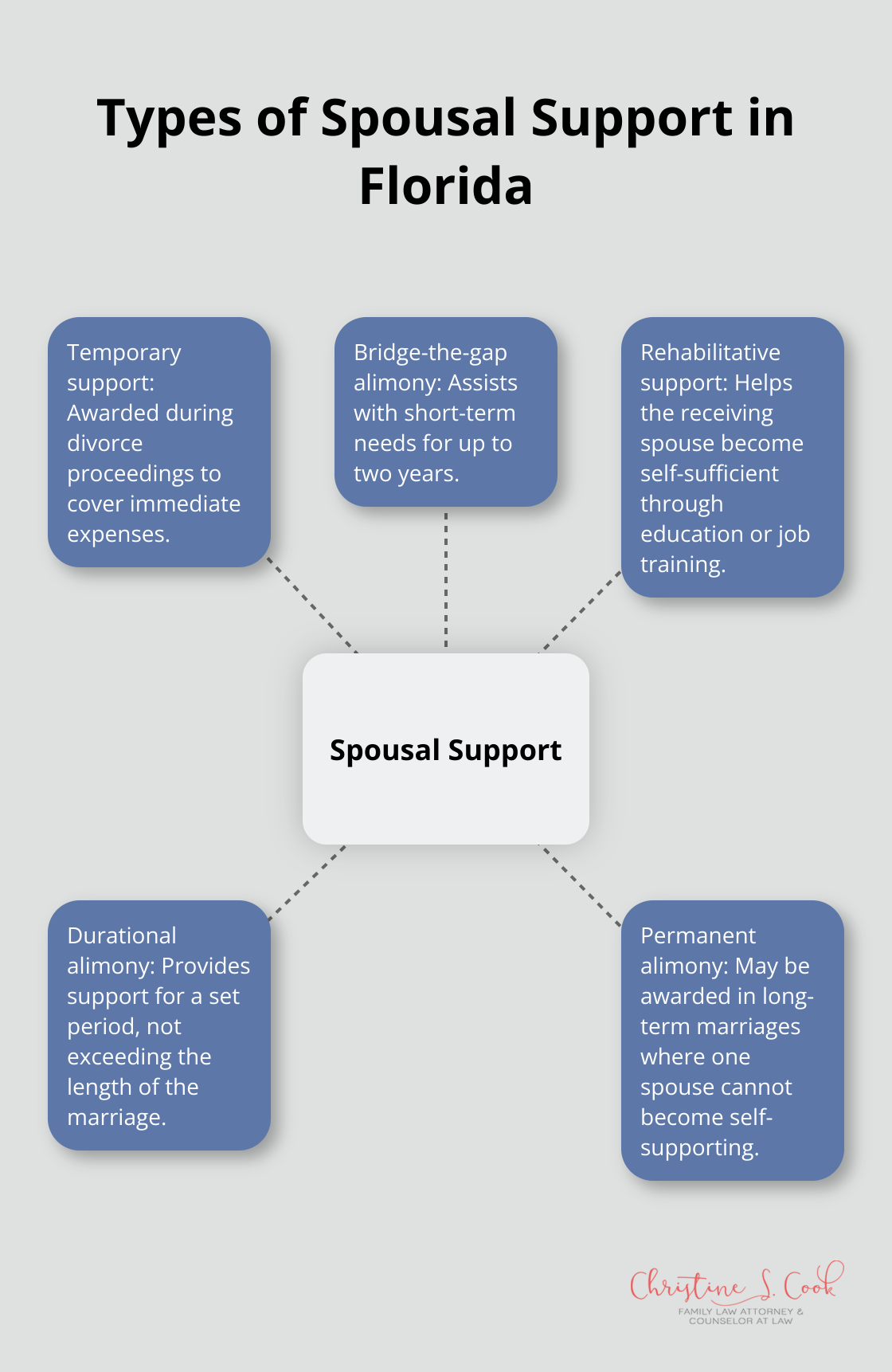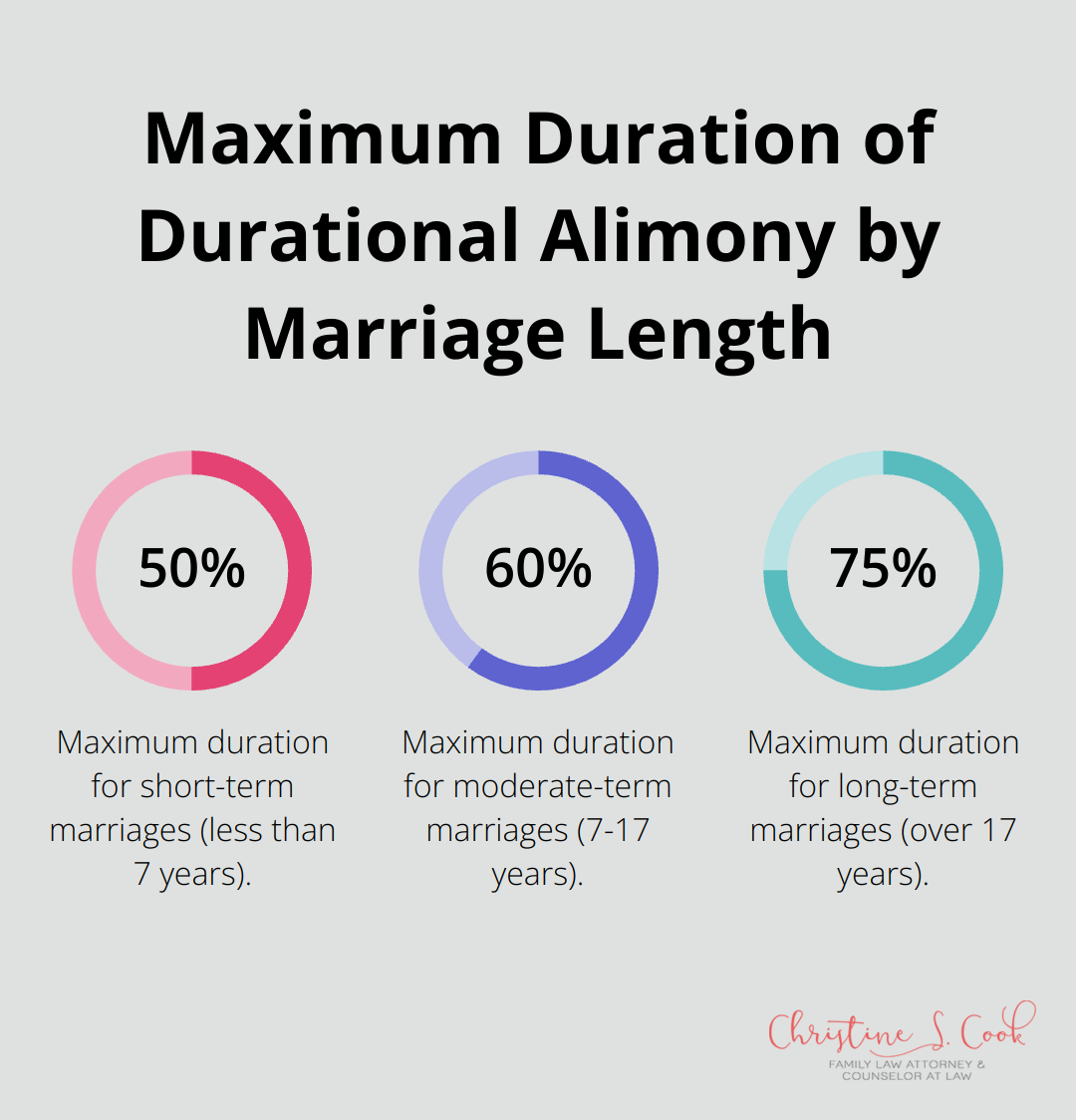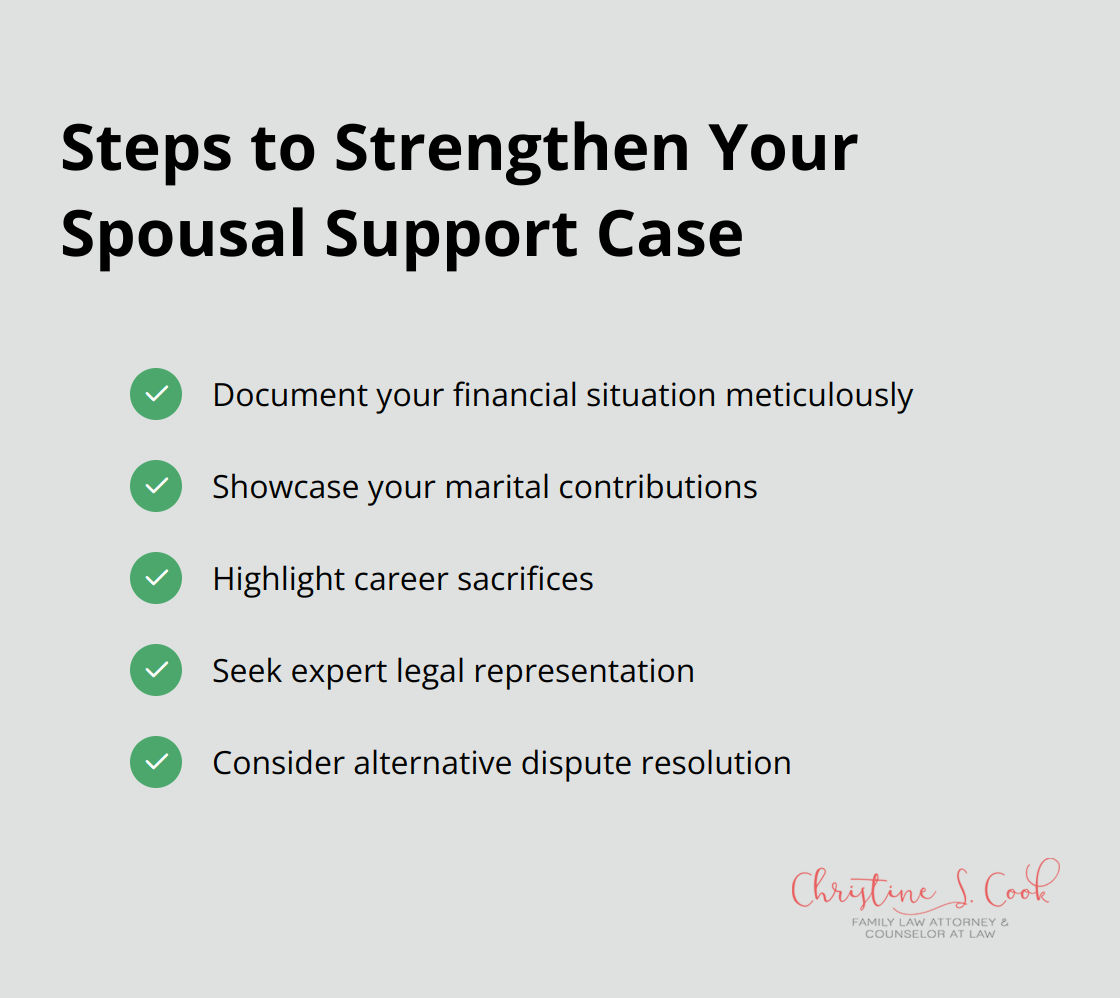Navigating the complexities of spousal support after divorce can be overwhelming. At Christine Sue Cook, LLC, we understand the challenges you face during this difficult time.
Our goal is to provide you with clear, actionable strategies to help secure the financial support you need. This guide will walk you through the key aspects of spousal support in Florida, from eligibility criteria to effective negotiation tactics.
Spousal support (also known as alimony) is a financial arrangement where one spouse provides monetary assistance to the other after a divorce. In Florida, this support helps the lower-earning spouse maintain a standard of living similar to what they experienced during the marriage. The court may award a combination of forms of alimony or forms of payment, including lump sum payments, to provide greater economic assistance.
Florida law recognizes several types of spousal support:

Florida courts consider multiple factors when they determine spousal support. An award of durational alimony may not exceed 50 percent of the length of a short-term marriage, 60 percent of the length of a moderate-term marriage, or 75 percent of the length of a long-term marriage.
The length of the marriage significantly influences support decisions:
Each category affects the likelihood and duration of support.
Courts examine income, assets, and debts to assess the need for support and the ability to pay. The standard of living during the marriage is another critical factor. If one spouse sacrificed career opportunities for the family, courts take this into account.
Age and health of both parties affect earning capacity and are considered in support decisions. Courts also evaluate each spouse’s contribution to the marriage (including homemaking and childcare). The presence of minor children and any marital misconduct can influence the decision as well.
Navigating the complexities of spousal support requires expert legal assistance. An experienced family law attorney can help present all relevant factors to secure fair spousal support arrangements. They can advocate effectively for their clients’ financial interests post-divorce and ensure that all legal requirements are met.
The next chapter will explore the specific eligibility criteria for spousal support in Florida, helping you understand if you qualify for this financial assistance after divorce.
Determining eligibility for spousal support in Florida requires a complex evaluation of several factors. The court aims to ensure fairness and financial stability for both parties post-divorce.
The requesting spouse must prove a genuine financial need for support. This involves a thorough financial documentation of their income, expenses, and assets. Clients should compile comprehensive records, which detail all sources of income, monthly expenses, and existing assets. This documentation proves the need for support.
A spouse who has been out of the workforce for an extended period due to family responsibilities may struggle to secure employment that matches their pre-marriage earning potential. The court may view this as a valid reason for awarding spousal support.
The other spouse’s ability to pay support without jeopardizing their own financial stability is equally important. The court examines the potential payer’s income, assets, and reasonable expenses to determine if they can afford to provide support.
In Florida, the amount of alimony awarded may not exceed 50 percent of the length of a short-term marriage, 60 percent of the length of a moderate-term marriage, or 75 percent of the length of a long-term marriage, as specified in the Florida Statutes.

The length of the marriage plays a significant role in spousal support decisions. Florida law categorizes marriages as short-term (less than 7 years), moderate-term (7-17 years), and long-term (over 17 years). Longer marriages are more likely to result in substantial or permanent alimony awards.
Courts also consider the standard of living established during the marriage. A significant disparity between the spouses’ post-divorce lifestyles may influence the support decision. However, maintaining an identical lifestyle post-divorce is often unrealistic, as supporting two households is typically more expensive than one.
The age and health of both parties are critical factors in spousal support determinations. Older spouses or those with health issues may have limited earning capacity, which could justify a higher support award. Conversely, a young, healthy spouse might become self-sufficient more quickly.
For example, a 60-year-old spouse with chronic health issues may have a stronger case for long-term support compared to a 35-year-old spouse in good health. The court considers how these factors affect each party’s ability to maintain financial independence.
Health conditions can significantly impact spousal support decisions. In some cases, a spouse with a degenerative condition might receive a more substantial support award due to their limited future earning capacity.
Understanding these eligibility factors is essential when pursuing spousal support. Each case is unique, and courts have considerable discretion in their decisions. The next section will explore effective strategies to secure spousal support, helping you build a strong case for financial assistance post-divorce.

Start by creating a comprehensive financial dossier. This should include:
Courts appreciate transparency, and thorough documentation can substantiate your need for support. Prepare to show every aspect of your financial life.
Your role in the marriage extends beyond financial contributions. Keep a record of:
These non-financial contributions often have significant monetary value. For instance, if you managed the household while your spouse built a successful career, this sacrifice directly contributed to the family’s financial success.
If you put your career on hold for your family, this can strongly support your case for spousal support. Gather evidence such as:
This information helps illustrate the long-term financial impact of decisions made during your marriage.
The complexities of Florida’s spousal support laws make professional legal guidance invaluable. An experienced family law attorney can:
While litigation is sometimes necessary, alternative methods like mediation or collaborative divorce can often lead to more satisfactory outcomes. These approaches can:
Clients who approach spousal support negotiations with an open mind often achieve more favorable results (while protecting their rights and interests).
Securing spousal support after divorce requires careful planning and strategic presentation of your case. You must document your financial situation, showcase your marital contributions, and highlight any career sacrifices you’ve made for your family. Professional legal guidance proves invaluable when you navigate the complexities of spousal support cases in Florida.
An experienced attorney will help you interpret recent legal changes and develop a compelling narrative for the court. They can also guide you through alternative dispute resolution methods, which often lead to more satisfactory outcomes. These approaches can reduce legal costs, expedite the process, and minimize emotional stress.
At Christine S. Cook, LLC, we specialize in family law and understand the nuances of spousal support cases in Florida. Our team provides compassionate and innovative solutions for divorce-related matters (including spousal support). We offer free consultations to discuss your legal needs without financial pressure, ensuring you have the information and support necessary to make informed decisions about your future.
